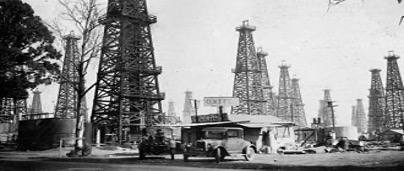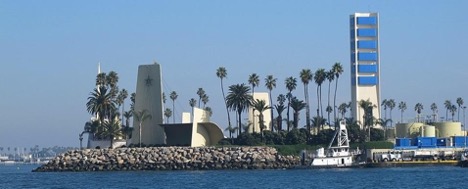by Thea Iberall, PhD
Signal Hill stands 365 feet above Long Beach in Southern California looking down on San Pedro Bay, home of the largest US port. In the 1500s, Tongva tribe members stood on the hill sending smoke signals to their families on Catalina Island. Early settlers used to call it the Bay of Smokes. Eventually, large homes were built on the hill, surrounded by an abundance of fruits, vegetables, and flowers. Even a Hollywood movie studio shot films there.
Signal Hill changed forever when oil was discovered in 1921. It became covered with over 100 oil derricks. They called it Porcupine Hill. It’s still a productive oil field, although it doesn’t look like one. There are still families living there in big houses surrounded by orange trees and flowers.

Buried deep in the fault zone, the secret is hidden
in the stench of the hill. I can feel it—smothered layers of
dead diatoms, algae that once photosynthesized sunlight
into hydrocarbons. For millions of years, the remains of the algae were buried, heated and pressurized, filling pockets in clay rocks, accumulating into massive amounts of oil—
rich, thick, debauched oil that fuels our trucks and planes
and lives as we send smoke signals with our cell phones
using the electricity sparked up by the secret of this hill.
On the hill, ten oil pumpjacks are caught in
various angles like low-nodding donkeys straining
to drain the hill of its black money and fetored decay.
There used to be hundreds of oil derricks on this foggy
hill like porcupine quills. It’s not that there are fewer,
it’s that most are camouflaged as condos and playgrounds.
I am reminded of the Sufi poem The Conference of the Birds by Farid-ud-din Attar. In this masterpiece, the birds of the world gather to seek a king. They are guided by the hoopoe who takes them through seven valleys. At each valley, the hoopoe shares obscure anecdotes to teach the birds (think of Zen Buddhism koans). For the Valley of Detachment, the hoopoe shares a story about a seeker on a spiritual quest. He meets a dog keeper who says he abandoned his spiritual life after 30 years to take care of dogs. When the seeker expresses his confusion, the dog keeper says, “I would rather look ridiculous than only appear as if I know the meaning of a spiritual life.” The dog keeper teaches the seeker how to take care of the dogs, and after much repetition, the seeker detaches from his search and learns it is enough to be living a homesteader’s life.

Out in San Pedro Bay are four small artificial islands (the THUM Islands) with buildings, a ritzy hotel, sculptured screens, a waterfall, and palm trees. At night, the structures are lit by colored lights. It’s quite beautiful, especially from atop Signal Hill. But it’s all fake, like a movie set. They’re actually a pump station. No one lives there; you’re arrested if you try to land. The billionth barrel of oil was pumped from the oil field in 2011. The islands were named for an acronym for the consortium of companies who built them: Texaco, Humble (now Exxon), Unocal, Mobil, and Shell.
Attar says, “Do you want to look spiritual or be spiritual?” Do you want to be a living environment for children or just look like one? Do you want to be a tropical island or just look like one? Do you want to do true t’shuvah and return to God during the month of Elul or just look spiritual?
Thea Iberall, PhD, is on the leadership team of the Jewish Climate Action Network-MA. She is the author of The Swallow and the Nightingale, an eco-feminist novel about a 4,000-year-old secret brought through time by the birds. In this fable, she addresses the real moral issue of today: not whom you love, but what we are doing to the planet. Iberall is also the playwright of We Did It For You! Women’s Journey Through History – a musical about how women got their rights in America, told by the women who were there. Along with her family, she was inducted into the International Educators Hall of Fame for creative teaching methods. In her work, she bridges between heart and mind, and she teaches through performance, the written word, poetry, sermons, workshops, and storytelling. www.theaiberall.com.
